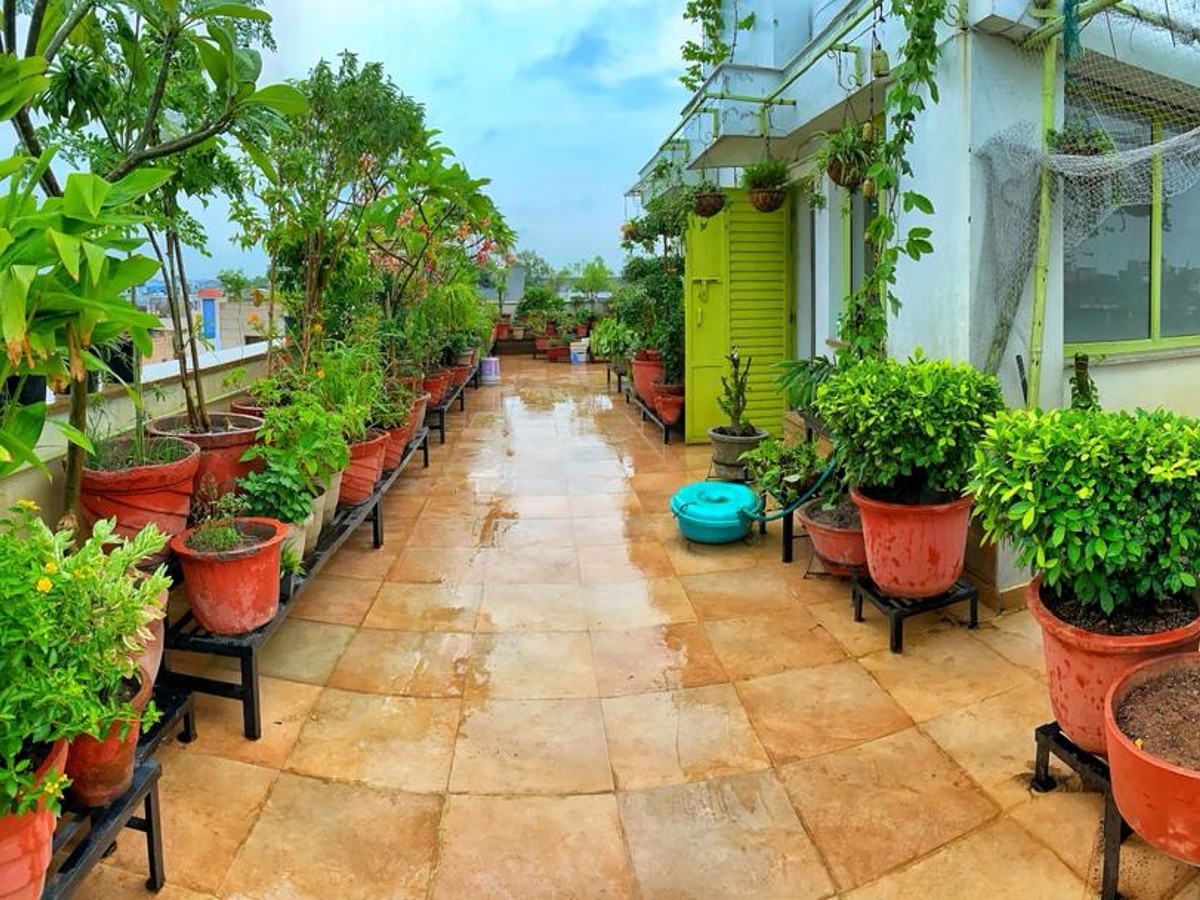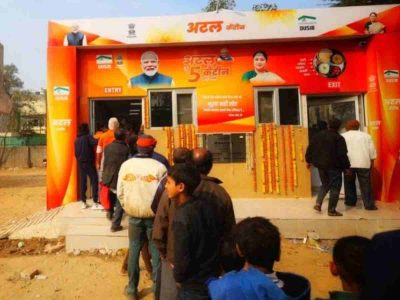We have heard about farm-to-fork, where fresh vegetables are bought directly from farmers’ markets, bypassing mandis and middlemen. Now, metro dwellers have taken another leap forward by turning small spaces such as terraces and balconies into herb and vegetable gardens. The bonus: It’s organic food.
For chef and food consultant Kishi Arora, the concept of growing one’s own food came much earlier than the pandemic. “We had a narangi (orange) tree in our home when I was a child, so I love the idea of home-grown food. But this love became a passion during my chef training days in the US.”
That was in 2007. Their landlord would grow his own food and treat them to organic meals, in lieu of Indian food. “One day, he suggested I maintain a small patch for growing coriander and vegetables. He even brought down my rent for this, as I took care of the home garden.”
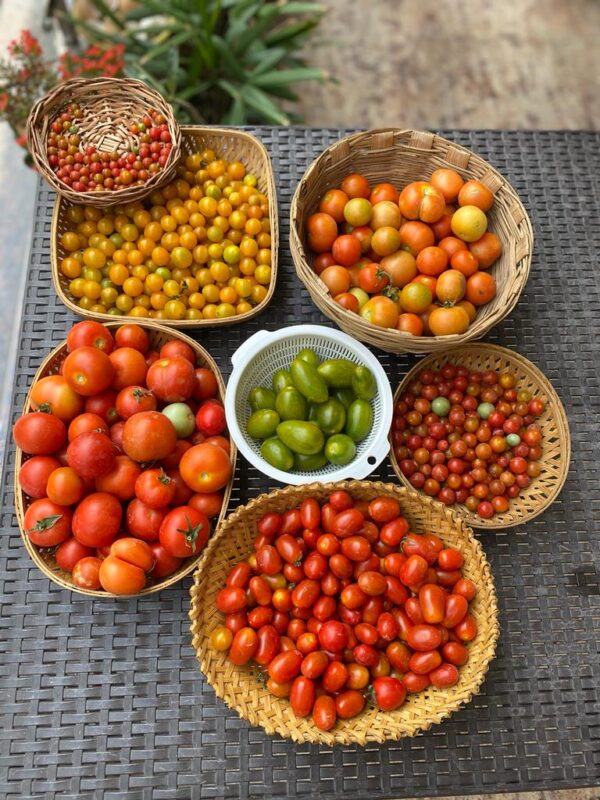
BASKET BALLS: From cherry tomatoes to the desi versions, there’s no price tag here
When Arora came back to India, she turned her East Delhi home into an urban garden with all kinds of flora, edible flowers and vegetables. She is an organised urban farmer for whom taking care of plants is as natural as breathing.
The terrace is a small world in itself, a space neatly classified according to the needs of the vegetable. Plants which need more sunlight are clubbed together and those which need more shade are in the far corner. She grows many different kinds of salad leaves, tomatoes, brinjals, karela, cauliflower, and more.
The young woman has gone a step further and even maintains a fish pond, using the water as a fertiliser, since fish excreta is an excellent nutritional source for plants. She shares all her knowledge about growing food on her insta handle @kishiarora.
Lush ecosystems
Landscape architect Anita Tikoo, who also lives in East Delhi, has turned her terrace into an urban farm, simply for the love of healthy food. It started as an interest, turned into a hobby and is now an integral part of her life, all within a decade.
“I like to grow foods that can take care of themselves. I grow saag (leafy green vegetables like spinach), amaranth and brinjal. Over the years, I have let the plants take care of themselves. The mustard keeps pollinating in different pots and growing by itself,” she says.
Tikoo enjoys cooking with seasonal ingredients and uses the food she grows in her own kitchen. She also conducts food workshops with like-minded people. She blogs about food at madteaparty.wordpress.com and her Instagram handle is @a_madteaparty. She shares her love for edible plants with people who are interested. “I created an edible patch in a school, educating them about the growth and its advantages.”
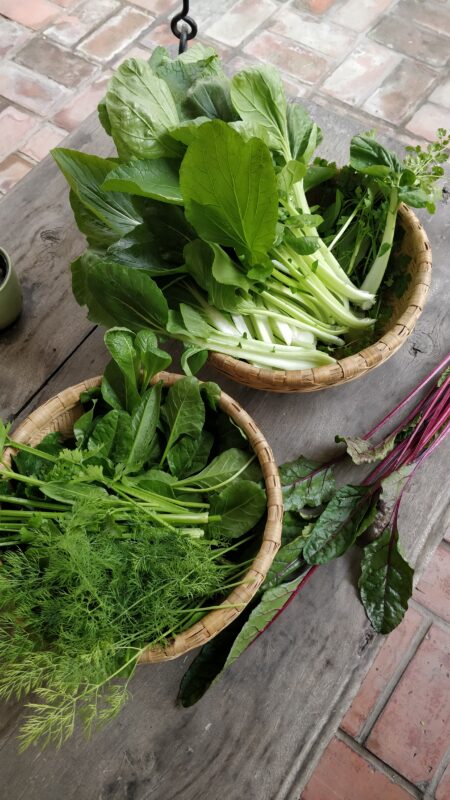
DAILY BREAD: Growing and cooking food at home are Anita Tikoo’s passions
Urban farmers also point out with satisfaction the fact that there are more birds and insects around their plants. The ecosystem is different and during the pandemic, the environs were surreal, as the lack of traffic turned the sky blue and the terrace greener.
For most, the pandemic was the game-changer. Covid-19 restrictions created a need to become self-sufficient and ignited a health movement. Masterclasses and workshops on kitchen gardening and hydroponics mushroomed on Facebook. Instagram became a tutorial ground too. From growing sweet potatoes and chillies to mint and coriander, the better food movement has become a fad, one that has the approval of environmentalists.
Until now, food gardening is a practice that few do consistently. Probably, the only edible plants found in most Indian homes are the tulsi, largely due to its religious significance. Some people grow chillies, curry patta plant, brinjal and tomato. Currently, growing your own food is limited to hobbyists, opines Tikoo.
Also read: Enjoy nature for free: 4 non-crowded parks in Delhi-NCR
Methodical urban farming needs resources, though hydroponics and aquaponics have become popular as they require less investment. But then it needs infrastructure and regular care. “As the water seeps into the walls, I have had tiles laid on my terrace,” says Arora. “I have also installed a proper water system and need to ensure that there is regular maintenance of the terrace and all the pots spread over different areas of the home.”
Training and support
For urban farming to become inclusive, affordable and accessible, technology, policies and practices will need to be formulated. Support by agriculture research institutes would benefit urban farmers. Proper training on cultivation and knowledge of different kinds of seeds would be welcomed by most.
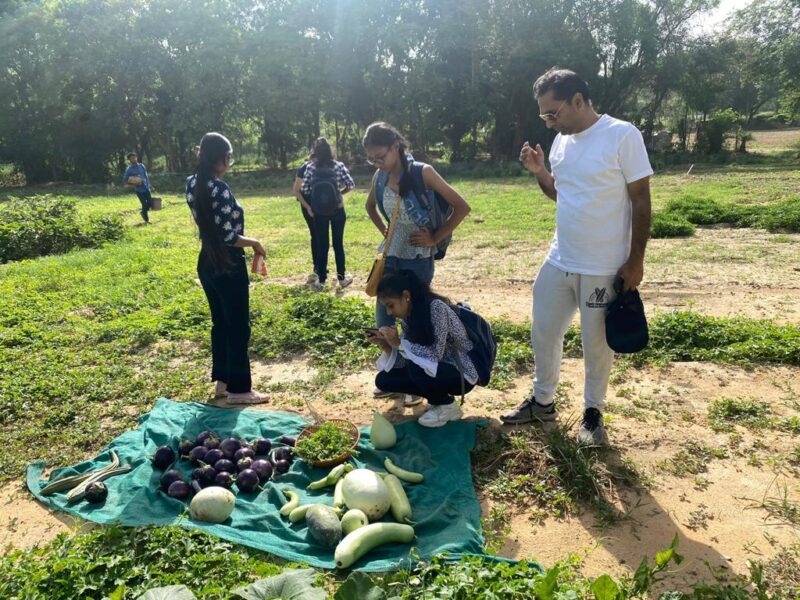
EXPERT GUIDANCE: A farm workshop by New Delhi Nature Society
One institution that has seized the initiative is the Delhi-based non-profit New Delhi Nature Society, which offers introductory workshops on farming. “The workshops teach the people about the basics of farming and are attended by both children and adults,” says the founder Verhaen Khanna, who holds the sessions at Green Vibes Farms on the Delhi-Gurgaon border.
In May 2022, Delhi’s Aam Aadmi party government announced that it would soon launch an Urban Farming Policy. Global best practices and solutions would be the focus to turn the density-populated capital into a healthier city. It would be a move to turn from chemically treated food to a more organic lifestyle.
The government realises that after all the skyscrapers and concrete infrastructure have been built, deforestation has taken place, rivers and streams destroyed, the capital needs a green cover through modern means. The government’s plan is to train the people of Delhi to grow their own fruits, herbs and vegetables in their own homes.
The government is in consultation with experts in areas of greenhouse farming, hydroponics, kitchen garden, farmlets, aeroponics (growing plants with roots suspended in air and spraying of nutrients) and aquaculture. Some of the identified companies are Flora Consultant, Bhumika Organics, Harwell Agro, MR Farms, Edible Roots, EasyGrow, RS Polymer and Sow Good, among others.
The modules for the programme would be prepared seeing the climatic and space conditions of Delhi. This project would also create new job opportunities in Urban Farming. With the Department of Horticulture as the nodal agency, the campaign would be taken to the public through various ways. With this project in place, Delhi would become a model for other metropolitan cities to enhance their green cover too.
Boost to ecology
Apart from the obvious advantages of growing your own food, it is good for the environment, says Lt Col (Dr) Supern Singh Shekhawat, a senior scientist who heads Krishi Vigyan Kendra and SKN Agriculture University, Jaipur. “When farming is done on landholdings, it is normally with a profit motive and by commercial enterprises.”
In large-scale farming, heavy use of pesticides and fertiliser became the norm after the Green Revolution. There is growing concern over the use of chemical-based products which cause pollution, degraded soil and water, climate change, stubble burning and health concerns. Urban farming is a palliative, and also eliminates food miles (the distances food has to be transported, adding to fuel consumption and pollution.).
Dr Shekhawat adds that urban farming is not as laborious as growing crops in large fields, “New technologies such as hydroponics, aquaponics and vertical farming have brought an ease in cultivation,” he adds. Most leafy vegetables can be grown in water, and people can choose to grow expensive vegetables such as broccoli or lettuce.
This brings down the cost of household budgets. The movement can be scaled up by doing trade-offs with friends and neighbours.
For long-term benefits, people would have to form groups, perhaps self-help groups and farmer producer organisations’, suggests Dr Shekhawat. All these would facilitate trade and give a boost to the ecology.
Follow us on:
Instagram: instagram.com/thepatriot_in/
Twitter: twitter.com/Patriot_Delhi
Facebook: facebook.com/Thepatriotnewsindia

